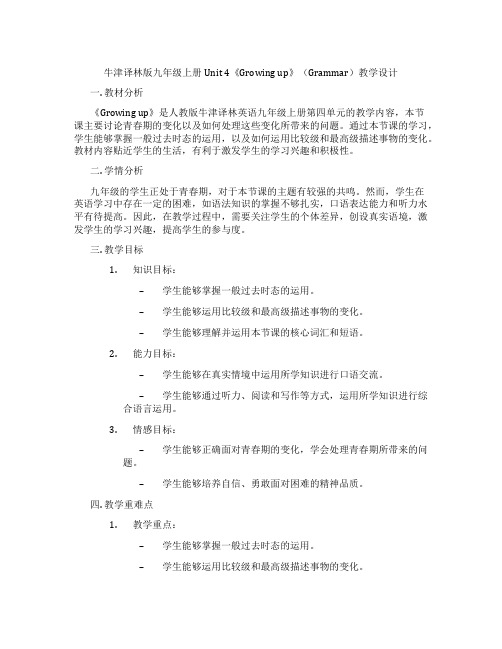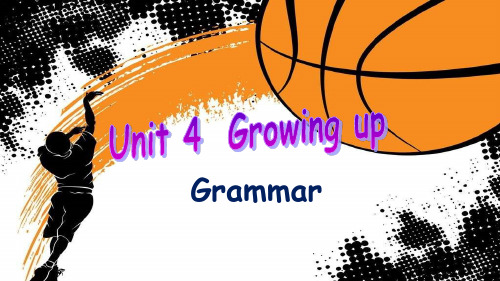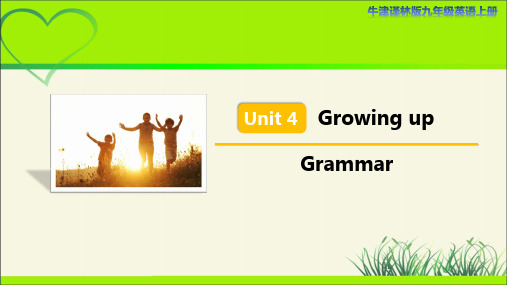9上Unit 4 grammar
牛津译林版九年级上册Unit 4《Growing up》(Grammar)教学设计

牛津译林版九年级上册Unit 4《Growing up》(Grammar)教学设计一. 教材分析《Growing up》是人教版牛津译林英语九年级上册第四单元的教学内容,本节课主要讨论青春期的变化以及如何处理这些变化所带来的问题。
通过本节课的学习,学生能够掌握一般过去时态的运用,以及如何运用比较级和最高级描述事物的变化。
教材内容贴近学生的生活,有利于激发学生的学习兴趣和积极性。
二. 学情分析九年级的学生正处于青春期,对于本节课的主题有较强的共鸣。
然而,学生在英语学习中存在一定的困难,如语法知识的掌握不够扎实,口语表达能力和听力水平有待提高。
因此,在教学过程中,需要关注学生的个体差异,创设真实语境,激发学生的学习兴趣,提高学生的参与度。
三. 教学目标1.知识目标:–学生能够掌握一般过去时态的运用。
–学生能够运用比较级和最高级描述事物的变化。
–学生能够理解并运用本节课的核心词汇和短语。
2.能力目标:–学生能够在真实情境中运用所学知识进行口语交流。
–学生能够通过听力、阅读和写作等方式,运用所学知识进行综合语言运用。
3.情感目标:–学生能够正确面对青春期的变化,学会处理青春期所带来的问题。
–学生能够培养自信、勇敢面对困难的精神品质。
四. 教学重难点1.教学重点:–学生能够掌握一般过去时态的运用。
–学生能够运用比较级和最高级描述事物的变化。
–学生能够熟练运用本节课的核心词汇和短语。
2.教学难点:–学生能够正确运用一般过去时态描述过去的事情。
–学生能够灵活运用比较级和最高级描述事物的变化。
五. 教学方法1.情境教学法:通过创设真实情境,让学生在实践中学习和运用语言。
2.任务型教学法:通过完成各种任务,提高学生的综合语言运用能力。
3.交际法:通过小组讨论、角色扮演等方式,增加学生之间的互动,提高口语表达能力。
六. 教学准备1.教学课件:制作课件,展示本节课的教学内容。
2.教学素材:准备相关听力、阅读和写作素材,帮助学生巩固所学知识。
牛津译林版英语九上Unit 4《Growing Up》(Grammar1)教学设计

牛津译林版英语九上Unit 4《Growing Up》(Grammar1)教学设计一. 教材分析牛津译林版英语九上Unit 4《Growing Up》主要讨论成长过程中的变化和经历。
本单元的Grammar 1部分主要引导学生理解并运用现在完成时态,通过照片和故事来描述自己成长过程中的变化和经历。
教材内容丰富,插图生动,有利于激发学生的学习兴趣和参与度。
二. 学情分析九年级的学生已经掌握了基本的英语语法知识,具备一定的听说读写能力。
他们对成长过程有自己的理解和体验,因此对于本节课的主题会感到熟悉和兴趣。
但部分学生对于现在完成时态的运用还不够熟练,需要老师在教学中给予指导和练习。
三. 教学目标1.让学生掌握现在完成时态的构成和用法。
2.培养学生用现在完成时态描述自己的成长经历和变化。
3.提高学生的听说读写能力,增强他们的英语综合运用能力。
四. 教学重难点1.现在完成时态的构成和用法。
2.如何运用现在完成时态描述自己的成长经历和变化。
五. 教学方法采用任务型教学法,让学生在实践中学习并掌握现在完成时态。
同时运用情境教学法,创设生动有趣的情境,让学生在真实的环境中运用英语。
六. 教学准备1.准备与成长过程相关的图片和故事。
2.设计相关的练习题和活动。
3.准备教学PPT。
七. 教学过程1.导入(5分钟)利用一张婴儿照片,引导学生谈论成长过程中的变化。
例如:“Look at this baby photo, can you guess who it is? Now let’s talk about the changes you’ve experienced since you wer e a baby.”2.呈现(10分钟)通过展示一张学生的成长照片,引出现在完成时态的概念和用法。
例如:“Look at this photo of XXX, we can see that XXX has grown a lot. Now let’s talk about XXX’s changes using the present perfect tense.”3.操练(10分钟)学生两人一组,互相描述对方的成长经历和变化。
牛津译林英语 九年级上册Unit4grammar(共16张PPT)

5. As soon as he finishes school, he
_w_i_ll__ta_k_e__(take) part in the training. 6. He won’t go home until he _f_e_e_l_s_(feel) tired out.
basketball? --- ________ he retired in 2011.
A. Until
B. Not until
C. Before
Complete David’s diary
Group work
I’m so crazy about basketball that I spend much time
David—Yao Ming’s big fan
当主句和从句主语一致 时,可省略从句的主语 和be动词
David was watching basketball
games _w__h_il_e__ his classmates
were watching cartoons.
_WW__hh_ie_lne_/_(he
durative verb (延续性动词)
was)attending
junior high, David tried out for
the school basketball team.
non-durative verb (短暂性动词)
__W__h_e_n__his mother came back,
Hawks的比赛中得到了41分。 3. 每当他被需要的时候,他都会回到中国。
(whenever)
译林版英语九年级上册_Unit4_Grammar名师教案

Unit4 Grammar名师教案I. Teaching aims and learning objectivesBy the end of the lesson, students should be able to:1. learn the structure of time clauses;2. use the conjunctions before, after, when, while, since, till, until, whenever, as soon as correctly;II. Teaching contents1. New words and phrases: against, career, feel tired out, become serious aboutbasketball, take part in the Olympics2. New structure: Until his dream came true, Spud never gave up.III. Focus of the lesson and predicted area of difficultyUse the conjunctions to make sentences or conversations.Ⅳ. Preview(课前预习)活动一:爱观察:本单元我们主要学习before, after, when, while, since, till, until, as soon as,和when引导时间状语从句,教材中Reading部分已学过的关于语法的句子有哪些?尝试在课本中画出来,观察它们有什么特点?试着找找规律吧!活动二:爱思考:仔细阅读教材Grammar部分,注意它们之间的的区别,观看视频讲解,尝试总结,我学到了什么?试着画出思维导图,拍照上传,与大家分享吧!活动三:爱创作:用学到的语法结构,再结合着本单元已学到的知识,尝试编一段对话或者故事,并将自己的成果上传分享!【备注:学生登录“优教·同步学习网”完成本课时预习任务,教师可通过备课端查看预习结果反馈,针对性进行课堂教学】Ⅴ.Teaching proceduresA Using before, after, when and whileStep 1 Warming-upT: Spud Webb is an excellent basketball player from the US. In China, there is also a great basketball star. Who is he?S: …T: Yes. David’s favourite basketball player! How much do you know about him?S: …Step 2 Presentation1. before, afterT: His parents are both basketball players. One is 2.08 m tall and the other is 1.88 m tall.Before Yao Ming was born, many people believed that he would be a basketball star.Did he become a basketball star later?S: …T: After he took some basketball training, he showed his talent in the game.2. When, whileT: When did he begin to take training?S: When he was 9, he began to take basketball training.T: Yes, he started training at 9.While/When he was attending junior high, he joined the Shanghai Youth Team. 【设计意图:以讨论David最喜欢的篮球明星姚明为线,导入新知识的学习。
牛津上海英语九年级上册 Unit4 grammar(共25张PPT)

school.
Consolidation: 形容词比较级的用法
1. 表示两者的比较,“than” 为标志词; 某些副词或短语 修饰比较级eg: even, far, still, a lot, a little, a bit…
2. Which/ Who(se) is +比较级,A or B? 3. the + 比较级+ of the two… (两者中较…) 4. 比较级+ and+ 比较级 (单音节和部分双音节词)
more and more + 原级 (多音节和部分双音节词) “越来越…” 5. the +比较级…, the +比较级… “越…,就越…” 6. 用比较级形式表达最高级概念: 比较级+ than any other+ 单数名词 比较级+than the other+ 复数名词 “比其他任何一 个都…”
Practise: The man is much_______(strong)than the other one. He sings terribly. His dancing is even____. A. terribly B. terrible C. more terrible D. more terribly
终更佳。
7. An eye finds more truth than two ears.百闻不如一 见。
Homework
1. Recite the six uses of comparative form of adjectives; 2. Finish the rest of the exercises.
译林版九年级英语上册Unit 4 Grammar示范公开课教学课件

past
was watching the gala
was watching fireworks
past
now
rang
was watching fireworks
Extension
3. Ron was watching the gala on TV when the bell rang.4. When Jennifer was watching fireworks, the bell rang.
Extension
“主将从现”
1. David will play basketball in the playground until it gets dark.2. David won’t go to bed until he finishes watching the NBA.
Read and circle
Ron wants to tell you more information about his friend, David.
Can roduce time clauses?
Extension
□
□
5. While Jennifer was watching fireworks, the bell rang.6. When Jennifer was watching fireworks, the bell rang.
□
□
Extension
Observe and learn
when/while
Read and combine
I go jogging every morning before I have breakfast.
After I practised playing basketball for hours, I felt tired out.
人教版英语九年级上册Unit4知识点梳理及语法讲解
⼈教版英语九年级上册Unit4知识点梳理及语法讲解Unit 4 I used to be afraid of the dark知识点讲解1. from time to time时常;有时,和sometimes, at times是同义表达。
常见的time短语有:what time ⼏点for the first time 第⼀次all the time ⼀直,总是;at times 不时,有时in time 及时;on time 按时,准时at the same time 同时have a good/great/wonderful time玩得开⼼3.It’s been three years since we last saw our primary school classmates.It has been+⼀段时间+since+含有过去式的陈述句“⾃…以来已经多长时间了”. 我在这⾥⼯作已经有⼀个半⽉了。
单项选择1、I’m looking after Tom today. He’s been in my house ________ 8:00 this morning.A.atB.sinceC.forD.till2、Shared bikes, which are environmentally friendly, _____ quite popular among big cities in China since last April.A.becameB.have becomeC.will become3、---Where is Jane? ---I don’t know. I ________ her since yesterday morning.A.haven’t seenB.didn’t seeC.won’t see4、Since we began to use the Internet, our lives _________ a lot.A.changeB.had changedC.will changeD.have changed4. I used to see him reading in the library every day.see sb. do sth . 看见某⼈做了某事指整个过程即:指动作经常发⽣或刚刚完成。
Unit4 Grammar21-22牛津深圳版九年级上册
III. Read the sentences and underline the two adverbials in each sentence.
1. Prince Charles opened a new sports centre in Stoke yesterday 2. He also spoke with several young people. 3. The sports centre was first planned in 1994. 4. Naturally, the local council could not finance the project without help. 5. Luckily, they managed to get money from the National Lottery.
间接宾语是接受东西的人。
直接宾语指被接受的东西。
Things to remember
When the indirect object comes after the direct object, to or for is
used.
The braces have brought so much trouble to me.
有些句子含有宾语。
宾语是动作的接受者,表示承受动作的人或物。
3 Sentences with verbs such as give, bring, buy and send can have a direct object (DO) and an indirect object (IO).
句子的谓语动词是give, bring, buy, send时,后面可接两个宾语:直接 宾语(DO)和间接宾语(IO)。
Unit4Grammar时间状语从句语法复习牛津译林版英语九年级上册
牛津译林版9A Unit 4 Grammar 时间状语从句语法复习(一)before,after,when和while引导的时间状语从句时间状语从句是指在复合句中充当时间状语的句子。
我们可以用before,after,when和while引导时间状语从句,这些连词既可放在句首,也可放在句中。
一、before引导的时间状语从句before意为“在……之前”,表示主句动作发生在从句动作之前。
▶She worked in Shanghai before she came here.她来这儿之前在上海工作。
▶Close the windows before you leave the room, please.在你离开房间前,请关上窗。
二、after引导的时间状语从句after意为“在……之后”,表示主句动作发生在从句动作之后。
▶After you think it over, please let me know your decision.你仔细考虑以后,请告诉我你的决定。
▶I went to school after I finished my breakfast.我吃完早饭后去上学。
▶Will you be free after two o’clock?2点钟之后你有空吗?三、when引导的时间状语从句when意为“当……时”,表示主句动作发生的特定时间。
从句中的谓语动词可以是延续性动词,也可以是非延续性动词。
▶When I got home,my mother was cooking diner.当我到家的时候,我的妈妈正在做饭。
▶I often think of my grandpa when I see the picture.当我看见这张照片时,我常常想起我的爷爷。
,四、while引导的时间状语从句while意为“在……期间”,表示主句动作发生在从句动作进行的过程中。
▶You can go swimming while I’m having lunch.我吃午饭时你可以去游泳。
Unit4Grammar课件牛津译林版九年级英语上册
1. I go jogging every morning. Then I have breakfast. __I_g_o__jo_g_g_i_n_g__e_v_e_ry__m_o__rn__in_g__b_e_f_o_re__I_h_a_v_e__b_r_e_a_k_fa_s_t_.__ 2. I practised playing basketball for hours. I felt tired out. A__ft_e_r_I__p_ra_c_t_i_se_d__p_l_a_y_in_g__b_a_s_k_e_tb_a_l_l_f_o_r_h_o_u__rs_,_I__fe_l_t_ti_r_e_d out. 3. I met Peter. I was waiting at the bus stop. _I_m__e_t_P_e_t_e_r_w__h_il_e_/w__h_e_n__(I__w_a_s_)_w__a_it_in_g__a_t_t_h_e_b_u__s_s_to_p_._ 4. I was watching TV. I received a call from my uncle. W__h_i_le__(_I_w_a_s_)_w__a_tc_h__in_g__T_V_,_I__r_ec_e_i_v_e_d_a__c_a_l_l _fr_o_m__m__y_u__ncle. 5. I was ready to go to bed. My father came back from work. I_w__a_s_r_e_a_d_y_t_o_g_o__to__b_e_d_w__h_e_n_m__y_f_a_t_h_e_r_c_a_m_e__b_a_c_k_f_r_o_m__work.
the room.
- 1、下载文档前请自行甄别文档内容的完整性,平台不提供额外的编辑、内容补充、找答案等附加服务。
- 2、"仅部分预览"的文档,不可在线预览部分如存在完整性等问题,可反馈申请退款(可完整预览的文档不适用该条件!)。
- 3、如文档侵犯您的权益,请联系客服反馈,我们会尽快为您处理(人工客服工作时间:9:00-18:30)。
at an earlier time than
at a later time than
before
after
Fill the blanks with “before” & “after”
before you 1. You should turn off the lights _________ leave the room. before leaving = You should turn off the lights _____________ before/after + 句子或doing形式 the room. after he finished his 2. Tom went to school ________ after finishing his breakfast. breakfast. = ______________ 3. Time passed quickly and three months went by before __________ I knew it. after the storm stopped. 4. The sun came out ________
Why is he so famous all over the world?
He ____ world-famous superstar _______ until he joined the NBA.
He _______ / practiced playing basketball very until/till the year hard __________ 2011, when he ended his basketball career.
Do you know him?
How much do you know about him?
2.08m & 1.88m
Before he was born, ________
he was believed to become a future basketball star.
Make a guess about Yao Ming’s legend!
How about his basketball career later?
When he was 18 years ________ old, he joined the national basketball team.
________ Since he joined the national basketball team, he has won many competitions. since在一般情况下,从句谓语动词用一般过去 时,而主句的谓语动词用现在完成时的延续形。
C2: Complete the following article with the correct conjunctions you have learnt in this unit.
B1.Practise: Fill in the blanks with since, till or until.
1.I have been crazy about playing basketball _______ since I was a little boy. 2.The weather has been awful this week. The rain did until for seven days. not stop_____ 3.We played basketball in the playground this afternoon__________ it was getting dark. until/till 4.It is the first time we have played basketball______ since Monday. We enjoyed ourselves very much. until/till 5.I waited for 20 minutes at the bus stop_________ the bus arrived. 主将从现 until 6.It is Friday evening. I will not go to bed_______ I finish watching my favourite TV programme.
A David is writing in his diary about one of
his days. Help him combine his sentences using before, after, when or while. (P54)
1. I go to jogging every morning. Then I have breakfast. I go jogging every morning before I have _____________________________________ breakfast. ________________________________ 2. I practised playing basketball for hours. I felt tired out. After I practised playing basketball for _____________________________________ hours, I felt tired out. _________________________________
注意:whenever可以用 every time替换。
C1. Practise: Fill in the blanks with as soon as or whenever.
as soon as school 1. David will go to play basketball___________ is over. 主将从现 whenever there is a game on 2.He watches the NBA_________ TV. Whenever he talks about basketball, he gets excited. 3._________ As soon as he learnt that the NBA players would 4.___________ come to China, he tried his best to get a ticket.
How to use “when” & “while”?
• When he was 9, he took some basketball training. • While (he was) attending the junior high, he joined the Shanghai Youth Team. when 既指时间点,也可指一段时间;因此 when引导的时间状语从句中的动词可以是终止 性动词或延续性动词 while 只指一段时间,while从句中的动词必须 是延续性动词。
3. I met Peter. I was waiting at the bus stop. ___________________________________ I met Peter while (I was) waiting at the _______________________________ bus stop. 4. I was watching TV. I received a call from my uncle. While (I was) watching TV, I received a ___________________________________ call from my uncle. ________________________________ 5. I was ready to go to bed. My father came back from work. I was ready to go to bed when my father ___________________________________ came back from work. ________________________________
1. When he was 9, 2. After he took some basketball training, 3. While (he was) attending junior high, ① he showed his talent in the game. ② he joined the Shanghai Youth Team. ③ he took some basketball training.
until/till
• until在肯定句中,主句的谓语动词必须是延续性 ________ 动词。 • 他一直在工厂里工作,直到成功地写出了一部戏剧。 He ________ worked in a factory ___________________ until he successfully _______ wrote a play. • not…until 直到…才……主句的谓语动词可为瞬间 性动词 • ( B )—When did you go to sleep last night? --- ________ I finished my homework. 补全! • A. Until B. Not until C. Before
Fill the blanks with “when” & “while”
when 1. The days get longer _________ spring comes. When/while the boys were playing football, it 2. ___________ rained. 正在此时,突然…… when the phone rang. 3. I was about to leave _______ while his brother is weak. 表对比 4. Jack is strong ______ When/while (she is) in trouble, she always 4. ___________ asks me for help. 当主句和从句主语一致且从句中有be 动词时,可省略从句的主语和be动词 B 5. While ______, he received a call from his mum. A. the TV was on B. he was watching TV C. he watched TV D. he is watching TV
